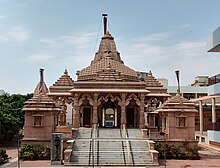Parshvanath Jain temples, Varanasi is a group of three Jain temples located in Bhelupur, Uttar Pradesh. The temples in Bhelupur were built to commemorate place for three kalyanaka of Parshvanatha.
| Parshvanath Jain temples, Varanasi | |
|---|---|
 Śvētāmbara Jain Temple Bhelupur, Varanasi | |
| Religion | |
| Affiliation | Jainism |
| Sect | Digambar, Śvētāmbara |
| Deity | Parshvanath |
| Festival | Mahavir Jayanti |
| Location | |
| Location | Bhelupur, Varanasi, Uttar Pradesh |
| Geographic coordinates | 25°17′58.3″N 82°59′59.8″E / 25.299528°N 82.999944°E |
| Temple(s) | 3 |
History
editAccording to Jain literature, Varanasi was ruled by King Aśvasena, the father of Parshvanatha, in 9th century.[1][2] Varanasi is as one of the holiest Jain pilgrimage centres and believed to be birthplace of four Tirthankar — Parshvanatha, Suparshvanatha, Chandraprabha and Shreyansanath. This is considered as one of the holiest pilgrimage places.[3][4] Bhelpur is believed to be birthplace of Parshvanath, the 23rd Thirthankara,[5] hence, a place for three kalyanak - Garbha, Janma, and Deeksha.[6][7][8] Mahavira also delivered sermons at Varanasi and Sarnath.[9]
Vividha Tirtha Kalpa, composed by Jinaprabha Suri in the 14th century CE, gives a detailed description of this temple.[10]
About temple
editA beautiful temple dedicated to Parshvanath is built here. The mulnayak of this temple is a 75 centimetres (2.46 ft) black-coloured digambar idol of Parshvanatha dating back to 9th-11th century and a 60 centimetres (2.0 ft) white-coloured Śvetāmbara idol of Parshvanatha.[4][7] It is located in Bhelapur about 5 km from the center of Varanasi city and 3 km from the Banaras Hindu University. It belongs to both sects of Jainism and is a holy tirtha or pilgrimage centre for Jains.[11]
-
Parshvanath Digambar idol
-
Parshvanath Digambar temple
-
Parshvanath-Padmavati temple
-
Main vedi inside Parshvanath-Padmavati temple
See also
editReferences
edit- ^ Balgoori 2013, p. 167.
- ^ Raychaudhuri 1953, p. 83.
- ^ "Varanasi" (PDF). Uttar Pradesh Tourism. p. 17.
- ^ a b UP tourism & Jain shrine.
- ^ Cort 2001, p. 179.
- ^ "kalyanak-bhumi". jainuniversity.org. Archived from the original on 22 October 2012. Retrieved 10 December 2012.
- ^ a b Singh 2009, p. 32.
- ^ Singh 2015.
- ^ Dodson 2021, p. 77.
- ^ Eck 2013, p. 76.
- ^ Singh 2009, p. 33.
Bibliography
edit- Cort, John E. (2001). Jains in the World : Religious Values and Ideology in India. Oxford University Press. ISBN 978-0-19-513234-2.
- Dodson, Michael S. (2021). Banaras: Urban Forms and Cultural Histories. Taylor & Francis. ISBN 9781000365641.
- Eck, Diana L. (5 June 2013). Banaras: CITY OF LIGHT. Knopf Doubleday Publishing Group. ISBN 9780307832955.
- Raychaudhuri, Hemchandra (1953). Political History of Ancient India: From the Accession of Parikshit to the Extinction of Gupta Dynasty. University of Calcutta.
- Singh, Rana (2009), Banaras: Making of India's Heritage City, Planet Earth & Cultural Understanding, Cambridge Scholars Publishing, ISBN 9781443815796
- Singh, Sarina (2010). India. Lonely Planet. ISBN 978-1-74179-151-8.
- Balgoori, Raju (2013). "Jaina Culture In Karimnagar District, Telengana - A Study". Indian History Congress. 74: 167–77. JSTOR 44158813. Retrieved 2 August 2023.
- Singh, Binay (25 August 2015). "4 Jain Tirthankaras born in Varanasi". Retrieved 18 November 2020.
- "Jain shrines". Uttar Pradesh Tourism.
External links
edit- Media related to Bhelupur Jain temple at Wikimedia Commons